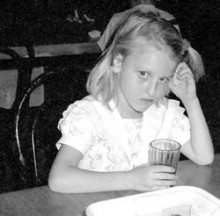A session of the Pervomaisk district council has assessed the local ecological situation as extremely acute. This was caused by the fact that several hundred of district residents had been taken ill with “toxicodermititis of an unspecified etiology” (i.e., unknown origin). The disease, first spotted last July in the village of Boleslavchyk, then spread over to three more populated areas: Chausove, Pidhirya, and Michurino.
As of September 1, a total 412 people, including 208 children, had fallen ill with toxidermititis since the disease broke out. 70 people, including 56 children, are undergoing in-patient treatment at the Pervomaisk district and Mykolayiv oblast hospitals. Moreover, the number of patients continues to rise daily: according to information from the oblast department of disaster-related medicine, those who fell ill also include four children’s doctors who gave first aid to victims in the disaster area; there are also cases of relapse. As for the doctors, they have combated the consequence, the disease itself, for two months, for the numerous commissions that worked in Pervomaisk district have not dared to identify the cause. However, no one conceals that the main version, now under consideration, of what caused the disease is the contamination of local water, soil, and food with products from the decay of rocket fuel: this is proved by the nitrates and chemicals found in samples and by the fact that shortly before the outbreak a pit was dug on the outskirts of Boleslavchyk, in which some components, communication units, and, presumably, fuel of a scrapped SS-18 missile had been buried. That the disease in Pervomaisk district had been caused by products of decayed rocket fuel was officially announced only on August 28. It seems that Ukraine’s chief public health doctor made a statement to this effect to time it with the visit of President Leonid Kuchma to Pervomaisk district on August 29.
Unfortunately, the Ukrainian leadership, watching with pain in heart the Barents Sea tragedy of our neighbors, did not seem to notice an ecological calamity of their own, the more so that the now confirmed version was suggested as long as a month ago by the Kharkiv Research Center of Military Ecology. However, waiting for official word, the authorities did not take any decisive action. For example, Oleksiy Harkusha, chief of the Mykolayiv Oblast State Administration, went to Pervomaisk in conduct a major conference on addressing the emergency only in August, when the disease had moved from Boleslavchyk, where it affected 168 people, to Chusove. Also, only in August was the evacuation of children from the contaminated villages organized, and by then over half of the 415 living in the disaster area had been afflicted. Speaking to The Day’s correspondent, the spokesman of governor Rostyslav Poradiuk failed to say how much money was needed to handle the emergency or how much money from the oblast and local budget had already been consumed by toxicodermititis: what he said was: “We are making the calculations.” Moreover, according to the spokesman, information on the situation in Pervomaisk district is being officially sent to the oblast administration only twice a week. Also worth noting is the fact that the elections of oblast council deputies were held on August 20 in two constituencies of Mykolayiv oblast. In one of them, No. 16 in Zhovtnevy district, an easy victory was won by Mr. Harkusha who also challenged the still office of the oblast council chairman. To do so, the governor chose the “calm” Zhovtnevy district, not the other vacant constituency, Pervomaisk, where he could have faced problems in connection with toxicodermititis with election turnout and their “high civic position.”
The local Pervomaisk council showed far greater concern. Deputies assessed the ecological situation as extraordinary and decided to ask central authorities for effective aid, including earmarking UAH 1.8 million for preventive treatment of the disease and removal of the sources of intoxication. They also intend to plead with the authorities to suspend the dismantling of missile sites strewn over Pervomaisk district and subject to destruction under the nuclear disarmament treaty.







